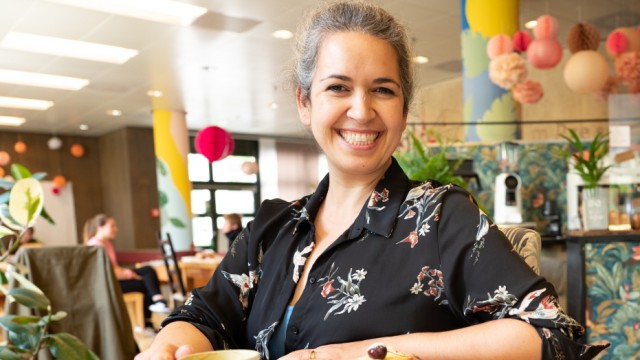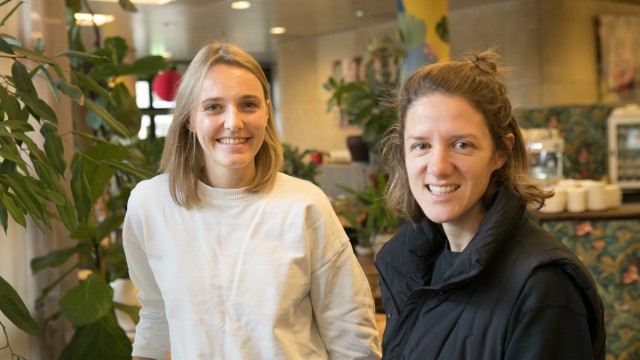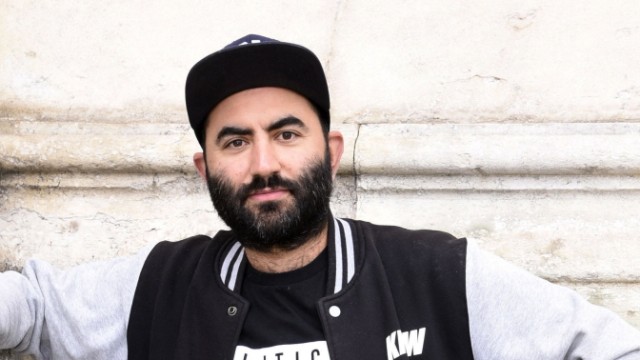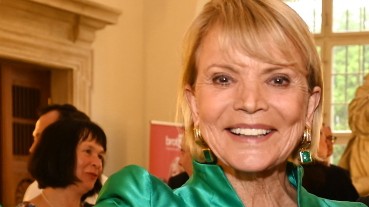Art for language
Sandra Singh and Francesco Giordano have a different mother tongue than their parents. Many migrant families were advised to speak German with their children in the 1990s, says Giordano. Some decided to do this to protect their children from discrimination.
The exhibition “Man speaks German” in the art space “Florida” (Lothringer Straße 13, on view from December 14th to 17th) follows lives. “I worked with my own children’s photos,” says Giordano, but also with images generated by an AI. “They show what I could look like if I hadn’t grown up in Germany, but in southern Spain and Sicily.”
Commitment to the cityscape
Caroline Klotz
(Photo: Friedrich Grössing)
Already since 2018 Caroline Klotz worked as a project officer for the Munich Forum. The 47-year-old is now taking over the position of managing director from Michaela Schier, who is leaving the discussion forum for urban development issues after a six-year term. Klotz initially worked as a travel agent, then studied anthropology with minors in intercultural communication and business administration. In a public job advertisement, a multi-stage selection process and a round of interviews before the association’s program committee, she prevailed as Schier’s successor. The mother of three children says she is very much looking forward to her new task; she is already “very familiar” with the tasks and challenges as well as looking after members.
In the Munich Forum, many citizens with specialist knowledge work publicly, vocally, effectively and occasionally against resistance from local politics and administration to have a positive influence on the development of the city and to prevent, as far as possible, designs of public space that they classify as bad planning . The fact that this is also attracting attention beyond the city was recently shown with the award to Klaus Bäumler: the head of the public green working group in the Munich Forum received the “Golden Linden Leaf”, the cultural prize of the German Society for Garden Art and Landscape Culture. Klotz has decided to increase the level of awareness of the association in the city’s society and wants “above all to strengthen the network with politics and administration.”
Prize for initiative

Günes Seyfarth.
(Photo: Alessandra Schellnegger)
“Eating what’s already there” is what “Community Kitchen” has written at the top of the menu. For its work, the team around the founder Günes Seyfarth, Judith Stiegelmayr and Natalie Gath now received a “Hidden Movers Award”. The Munich-based Deloitte Foundation uses the prize to honor initiatives that “create future-oriented educational opportunities for young people” with their projects.

Natalie Gath (left) and Judith Stiegelmayr.
(Photo: Florian Peljak)
The five selected organizations will receive a total of 75,000 euros as well as coaching with the Social Entrepreneurship Academy. In the Community Kitchen restaurant in Munich’s Neuperlach district, the makers emphasize that they cook with food that would otherwise end up in the trash – in the best quality. According to their statements, they save many hundredweights of food from the bin every week. The non-profit GmbH also offers catering, event support and environmental education, such as the “Foodrescue” project, which aims to raise awareness among young people about the issue of food waste.
Rap for peace

Achim “Waseem” Seger.
(Photo: Steffi Adam/imago images/Future Image)
Hip-hop, critical and political, but with a positive touch, that’s what it brings Achim “Waseem” Seger on the stage. The rapper, born in Munich in 1985, is a qualified business economist, head of department at the district youth association, and state chairman of the hip-hop party “Die Urbane”. He co-founded the AusARTen festival, which was awarded the Citizens’ Prize for Democracy. The Bavarian with Egyptian roots is a devout Muslim and married to a Jew. He will talk about his work and his music on December 13th, 7 p.m., in the Habibi Kiosk at the Munich Kammerspiele, and there will also be a few songs. Admission free.
Biography for everyone

Actress Uschi Glas.
(Photo: Robert Haas)
Actress released for her 80th birthday Uschi Glas her autobiography next year. The title is “I was never a darling,” as her publisher in Munich announced recently. He alludes to the film “Get to the point, darling,” which made Glas famous. “She writes about how to find yourself and stay true, why independence has always been important to her as a working woman and mother, and about getting older in an industry in which actresses in particular often have an expiration date,” writes the publisher, quoting her with one Sentence about aging: “Anyone who complains about getting older should just die sooner.” The book is scheduled to be released on February 28th, just before her 80th birthday on March 2nd.
Glas, who was born in Landau an der Isar in 1944, is the youngest of four children. She initially wanted to become an architect after school, but then received training in technical drawing and accounting at her father’s company, who was a department manager at a car company. In 1965 she was discovered for the film by the Berlin producer Horst Wendlandt. She played a leading role in Winnetou in 1966 and became famous in 1968 at the latest with the film “To the point, darling”. Successes such as “Always Trouble with the Timpanists” followed, and from 1969 she also appeared at the theater. She was seen alongside Elmar Wepper in “Polizei-Inspektion 1” or “Zwei Münchner in Hamburg”. In “Fack ju Göhte” in 2013 she played an annoying, bullied old teacher. She is also a screenwriter, has recorded records and has been involved with her association brotZeit for many years for disadvantaged children who often do not have enough food.

